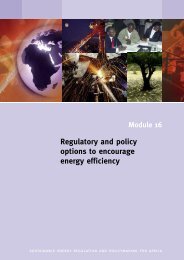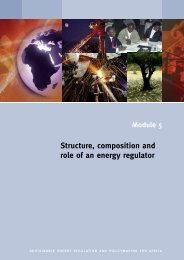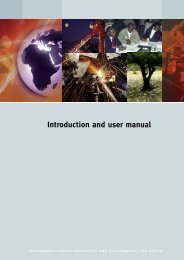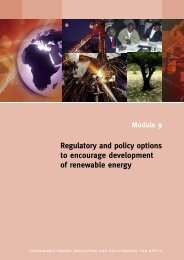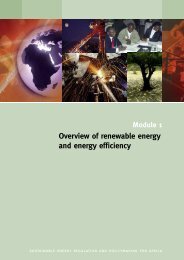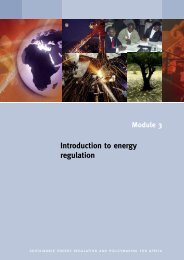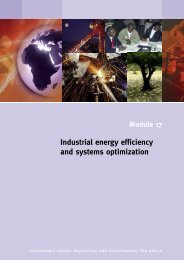Increasing access to energy services in rural areas - REEEP ...
Increasing access to energy services in rural areas - REEEP ...
Increasing access to energy services in rural areas - REEEP ...
Create successful ePaper yourself
Turn your PDF publications into a flip-book with our unique Google optimized e-Paper software.
MODULE 10: INCREASING ACCESS TO ENERGY SERVICES IN RURAL AREAS<br />
page 10.45<br />
9. CONCLUSION<br />
A key form of <strong>in</strong>tervention <strong>in</strong> the bid <strong>to</strong> <strong>in</strong>crease the <strong>access</strong> of <strong>rural</strong> people <strong>to</strong><br />
<strong>energy</strong> <strong>services</strong> is f<strong>in</strong>anc<strong>in</strong>g. Many renewable technologies best suited <strong>to</strong> provid<strong>in</strong>g<br />
<strong>energy</strong> <strong>services</strong> <strong>to</strong> remote <strong>rural</strong> <strong>areas</strong> use non-monetized fuel, but have a prohibitive<br />
<strong>in</strong>itial capital cost. At the same time, many develop<strong>in</strong>g country<br />
governments are actively promot<strong>in</strong>g the replacement of fuel-wood by subsidiz<strong>in</strong>g<br />
other <strong>energy</strong> sources. However, the success of such fuel substitution and <strong>energy</strong><br />
<strong>access</strong> programmes basically depends on two fac<strong>to</strong>rs largely beyond government<br />
control: economic growth and the correspond<strong>in</strong>g <strong>in</strong>crease <strong>in</strong> personal <strong>in</strong>comes that<br />
would permit consumers <strong>to</strong> switch fuels. The substitution process <strong>in</strong> many countries<br />
is hampered by high import costs result<strong>in</strong>g from the <strong>in</strong>efficient procurement<br />
of small quantities of renewable <strong>energy</strong> technologies.<br />
Subsidies are a conventional means <strong>to</strong> overcom<strong>in</strong>g the f<strong>in</strong>ancial obstacles, but<br />
this approach presents various difficulties. The welfare objective embodied <strong>in</strong> subsidies<br />
for <strong>rural</strong> electricity, or commonly used fuels such as kerosene, LPG and<br />
diesel, can often fail <strong>in</strong> its purpose, because of the diversion of these <strong>energy</strong><br />
sources <strong>to</strong> un<strong>in</strong>tended uses, or their disproportionate use by the more affluent,<br />
who could anyway afford the real costs of <strong>energy</strong> supply.<br />
A reduction or removal of pric<strong>in</strong>g subsidies <strong>to</strong> overcome this problem is, however,<br />
not straightforward because of its potential adverse impacts on the poor. The partial<br />
withdrawal of kerosene price subsidies <strong>in</strong> Sri Lanka and Myanmar, for example,<br />
forced people <strong>in</strong> some <strong>rural</strong> <strong>areas</strong> <strong>to</strong> return <strong>to</strong> the use of fuel-wood. Both<br />
these countries suffer from deforestation and this could have serious environmental<br />
implications for them <strong>in</strong> the long run.<br />
Private sec<strong>to</strong>r participation is always the most important option for <strong>energy</strong> <strong>access</strong><br />
<strong>to</strong> <strong>rural</strong> people, and <strong>in</strong> the most of the develop<strong>in</strong>g countries, private <strong>in</strong>vestments<br />
become the crucial measure <strong>to</strong> ensure the <strong>energy</strong> supply <strong>to</strong> <strong>rural</strong> people.<br />
There is a clear need for plann<strong>in</strong>g <strong>in</strong>tegration between <strong>rural</strong> electrification authorities,<br />
m<strong>in</strong>istries and transmission and distribution system opera<strong>to</strong>rs. An <strong>in</strong>dependent<br />
or semi-<strong>in</strong>dependent <strong>energy</strong> regula<strong>to</strong>r, be<strong>in</strong>g an essential partner for the<br />
national government <strong>in</strong> implement<strong>in</strong>g the <strong>energy</strong> policies, should be handed the<br />
mandate and the resources <strong>to</strong> coord<strong>in</strong>ate the consultation process.<br />
In summary, <strong>rural</strong> development <strong>in</strong> general and <strong>rural</strong> <strong>energy</strong> specifically need <strong>to</strong><br />
be given much higher priority by policy makers and regula<strong>to</strong>ry agencies; <strong>rural</strong><br />
<strong>energy</strong> development must be decentralized <strong>to</strong> put <strong>rural</strong> people themselves at the<br />
heart of plann<strong>in</strong>g and implementation; and <strong>rural</strong> <strong>energy</strong> development must be<br />
<strong>in</strong>tegrated with other aspects of <strong>rural</strong> development.



